Subtotal: $
Checkout-

The Immortality Machine
-

The Immortality Delusion
-

Simulating Religion
-

Insight: Finding Someone to Worship
-

The Pencil Box
-

Why Children Need White Space
-

Insight: Friedrich Froebel
-

The Technology of Gender
-

Digging Deeper: Issue 15
-

The Gods of Progress
-

Anabaptist Technology
-

Your Neighbor Lives Next Door
-

Insight: Why I Am Not Going to Buy a Computer
-

The Perfect Tool
-

Endangered Habitat
-

The Pen and the Keyboard
-

Meet a True Story
-

A poem for my son about grace
-

Editors’ Picks Issue 15
-

The Soul of Work
-

Go On, Inner Man
-

Viktor Frankl
-

The Joys of Tech Asceticism
-

Readers Respond: Issue 15
-

Family and Friends
-

How to Homestead a Hermitage
-

Awake the Harp

This past September, First Things editor R. R. Reno, veteran civil rights activist John M. Perkins, Professor Robert P. George, and others gathered at the Union League Club in New York City to honor the life of Johann Christoph Arnold, who died earlier this year. Arnold, who led the Bruderhof communities for two decades, was a pastor, author, and tireless worker for peace, reconciliation, and justice. The breadth of his influence was reflected in the speakers who gathered to remember him. Selections from their remarks follow.
Already a subscriber? Sign in
Try 3 months of unlimited access. Start your FREE TRIAL today. Cancel anytime.
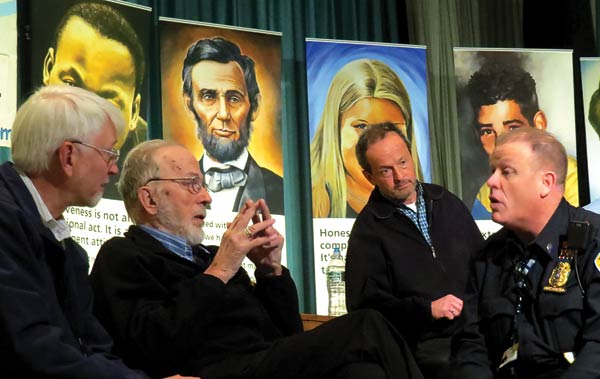
Robert P. George
Christoph’s wisdom was the fruit of a life lived in a community dedicated to Christlike simplicity and love. Those are the virtues that he modeled, not just for the members of the Bruderhof communities but for all who came into contact with him. When I was with Christoph, I never left without experiencing what it must have been like to know one of the apostles of Jesus, to know someone who had walked with Jesus, who had talked with Jesus, who had eaten with Jesus, who had confided in Jesus. That’s because Christoph was, of all the people I’ve known in my life, the one I most think of as a friend of Jesus – a personal friend of Jesus – and Christoph lived his life as a servant of God.
Robert P. George is McCormick Professor of Jurisprudence at Princeton University.
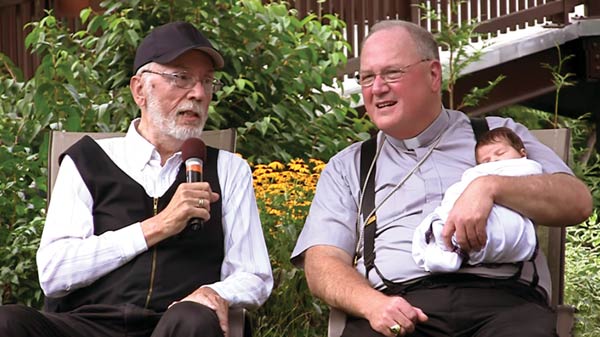
Arnold with Cardinal Dolan in 2015
Timothy Cardinal Dolan
I came to know Pastor Johann Christoph Arnold soon after my arrival as archbishop of New York in 2009. Here in the archdiocese we have enjoyed a deep bond with the Bruderhof. You know what the late lamented Father Benedict Groeschel once whispered to me? “They are better Catholics than I am!”
Pastor Arnold was especially courageous in his rock-solid conviction that God’s word as revealed in the Bible is true and reliable and that the incarnate Word, Jesus, was the way, the truth, and the life. He was sensitive to God’s presence, even in adversity and setback.
Timothy Cardinal Dolan is the Archbishop of New York.
Dr. R. R. Reno
Life in Christ, and community of the body of Christ, gives us a place to stand. Anyone visiting the Bruderhof community senses that the people in that community have a place to stand, a community of accountability, of encouragement, of teaching, of prayer, and of mutual sacrifice. As I have learned from reading Pastor Arnold and observing the Bruderhof community, this freedom is central to peace and to peacemaking, which I think is a great charism of the Bruderhof community.
R. R. Reno is editor of First Things magazine.
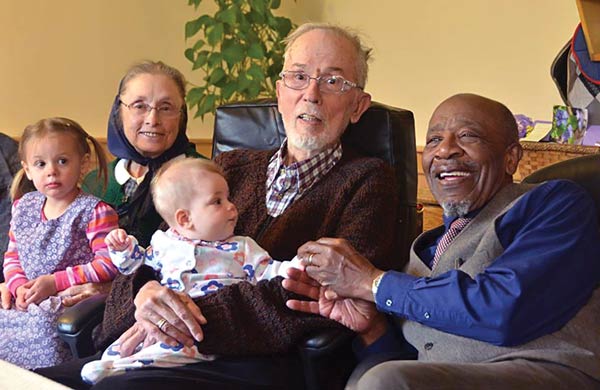
Relaxing with his wife, Verena, and John Perkins
John M. Perkins
I met Christoph in the early eighties, two decades after I had gone back to Mississippi to establish what would become the Christian Community Development Association (CCDA). I was looking for a better expression of justice and love and community that reflected the New Testament. I found in Christoph another seeker for justice and righteousness. We came together to talk about how authentic reconciliation could take place in our society. So keep moving, keep seeking a greater expression of human freedom and justice.
Dr. John M. Perkins is a pastor, author, civil rights activist, and founder of CCDA.
Stacey Rein
Since 2012, the Bruderhof and the United Way of Ulster County have prevented 422 families (1,266 individuals, 67 percent of them children) from becoming homeless. The majority of these families have one thing in common: they are working. But their jobs are low wage, paying not enough to contend with life’s curve balls but too much to make them eligible for government assistance. Some examples were a nurse at a local hospital whose husband left her and her three children with no child support; a single mother who was working three different jobs to make ends meet but became ill and needed surgery; and a family that had to provide care to a terminally ill relative. Where do families like this go? Who is going to help them? In Ulster County, we have been blessed to have the Bruderhof communities living among us; they reached out and offered assistance. As Pastor Arnold writes in his book Cries from the Heart: “Loving thoughts and words must be brought to fruition in concrete deeds.”
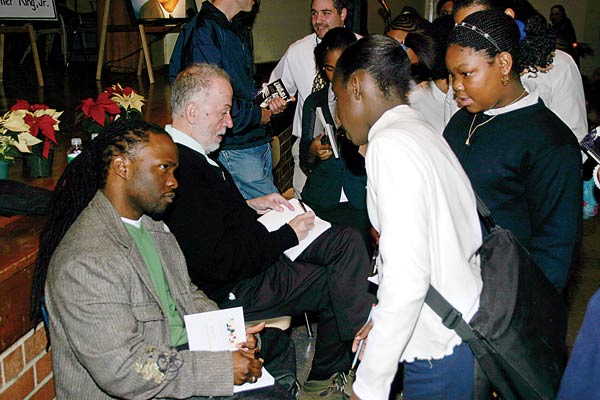
Hashim Garrett, left, joins Christoph signing books after a Breaking the Cycle assembly.
Hashim Garrett
I would watch Christoph Arnold, with his tall, six-foot-five stature, talk to students about forgiveness in a thick German accent, and it struck me: “If he can get up in front of these kids that don’t look anything like him, and with a fifty-year age gap, and talk about forgiveness, I’m gonna do it too.” And I did.
I was Muslim when I met Christoph. Before our Breaking the Cycle assemblies, he would say, “Hashim, tell them that you are Muslim.” And I go, wait a minute, I’m black, I’m crippled, I used to be in a gang, and you want me to tell them I’m Muslim! Gosh, Christoph, man! Gosh! But if you say so, I’ll do it, man! And I’d go, “Look, I’m Hashim. I’m Muslim and my brother is Christian and we are here together.” And he would say, “That’s it! Do it.” Sometimes he would go out on a ledge and talk about God in public schools. And then it would be my turn to go up and talk, and I would think, well, if my brother went out on a ledge, he is not going to be out there by himself, so here it goes, yeah – “God is real.” That’s right. And if you are gonna kick him out, you are gonna kick me out too.
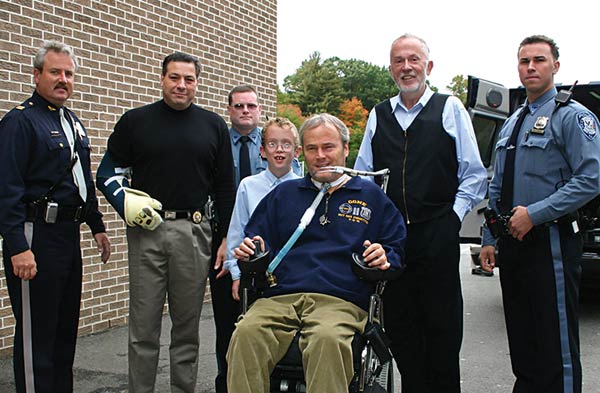
Arnold with Steven McDonald, front
Patrick Regan
The New York State Police is an agency of five thousand sworn people. We are among the ten largest police agencies in the country. Upstate New York has many communities that are served by a local police department, a county sheriff’s department, and the state police, all doing the same thing in the same area. And twenty-five years ago it was a very bad equation: a lot of parochialism and departments failing to ask for or offer assistance or share information. This was at the expense of public safety. In Ulster County, we began to meet as a police chiefs association, and in these meetings we began to break down barriers.
In 2004 I took command of the state police in Ulster and Greene counties at about the same time that Christoph and the Bruderhof’s relationship with the Ulster County Police Chiefs Association really began to grow. Christoph’s involvement strengthened relationships within the police force through his ability to reach people on a personal level. He also forged new connections between law enforcement and the surrounding community – clergy, community groups, elected officials, and others. Personally, I was inspired by Christoph to do more outreach. You would think his message of peace and reconciliation would be at odds with law enforcement, but it really was not.
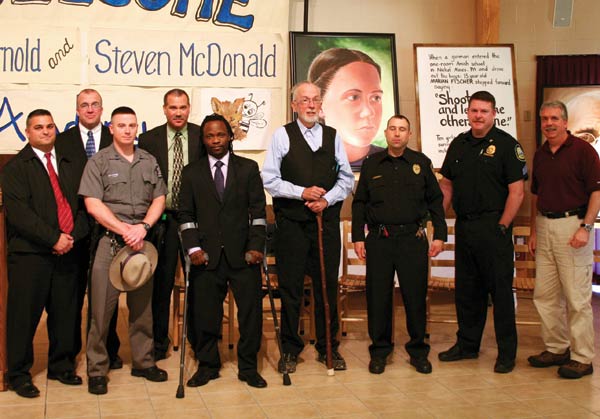
Christoph, center, with Hashim Garrett and other Breaking the Cycle advocates
In the last years, an atmosphere of mistrust between communities and law enforcement has grown. In Ulster County there were many incidents – whether with hate groups or unfortunate encounters between law enforcement and communities – just like in communities across the country. But because of the bridges that Christoph built or inspired, there were dialogues that prevented disasters like we have seen in so many other communities.
I have also seen the impact of Christoph’s counseling for law enforcement families. He was there for members of law enforcement who were traumatized by what they had seen or endured, and for families of officers who had killed themselves or been killed in the line of duty. What spoke to me about Christoph’s selfless investment in these people was not so much his counseling work, but the lasting bonds that he built. Often counselors have one interaction and then it is over, but I know families who still turned to Christoph and the Bruderhof a decade after their first interaction.
Christoph’s legacy is evident in the people who talk about him, who are anxious to continue his work. While he is sorely missed, he is still with us and so is his message. For that I am grateful.
Watch the full event at plough.com/arnold.
Photographs courtesy of the Arnold family
Already a subscriber? Sign in
Try 3 months of unlimited access. Start your FREE TRIAL today. Cancel anytime.





































METİN ERDEM
Thank you for all you did for us brother Christoph. We are reading your books and so you still help us to understand the life. You lived a real life, a life for others. Death leaves A heartache no one can heal, Love leaves A memory no one can steal.